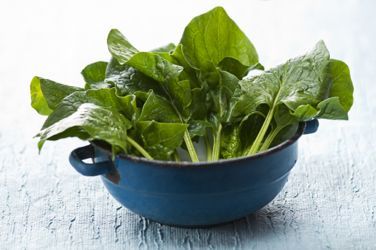Everyone knows that spinach and other leafy greens are packed with important nutrients. What’s less known is that these veggies come with built-in appetite regulators.
Swedish researchers have discovered that thylakoids—the membrane-enclosed photosynthetic “pouches” inside the chloroplasts of green leaves—trigger satiety signals in humans. In essence, thylakoids are a naturally occurring appetite suppressant that can help people regulate food intake, prevent weight gain, and promote weight loss.
Thylakoids are the most abundant biological structures on earth. They are comprised primarily of galactolipids, and are found inside the chloroplasts of all green leaves as well as all forms of cyanobacteria. They constitute the primary site of the light-dependent reactions of photosynthesis.
It turns out that when animals—including humans—eat leafy greens, the thylakoids in the plant material delay digestion by binding to lipids, thus slowing the ability of pancreatic lipase and co-lipase to hydrolyse the fats. Thylakoids also trigger the release of cholecystokinin, a key signal of satiety.
Apolipoprotein E-deficient mice fed a high-fat diet containing 41% of fat showed marked increases in cholecystokinin when their diets also included high-levels of thylakoids for 100 days. Compared with a group of control animals, the thylakoid-fed mice ate less, gained less weight, and showed lower serum glucose, triglyceride and free fatty acid levels (Kohnke R, et al. Phytotherapy Research, 2009; 23:1778-1783).
Signaling Satiety
Dr. Rickard Kohnke and his team at the Department of Experimental Medicine, Lund University, Sweden, found a similar pattern of beneficial effects in healthy humans. Eleven subjects of normal weight and in good health were given a high-fat meal (in the form of a pesto sandwich) with or without the addition of thylakoids. The control sandwiches had a total energy content of 544 kcal (66% fat, 25% carbs, 9% protein). The thylakoid-fortified sandwiches—containing either 25 g or 50 g of supplemental thylakoids in the pesto—had higher overall caloric content (719 kcal and 631 kcal, respectively).
At 120 minutes following the meal, the people who’d eaten the thylakoid-rich sandwiches showed significant increases in CCK levels, as well as reductions in
ghrelin, a primary appetite signaling hormone. Interestingly, there was also a rise in leptin—an important signal of satiety—360 minutes after the meals.
Moreover, people eating the thylakoid pesto had lower insulin levels than those eating the control sandwiches, though glucose levels remained unchanged (Kohnke R, et al. Scand J Gastroenterol. 2009; 44: 712-719).
The discovery that increased consumption of thylakoids can raise leptin concentrations in blood six hours after eating is a particularly important finding, given that leptin plays a key role in regulating energy intake between meals and over longer periods of time.
Hunger, and cravings (especially after meals) can be a major problem for people trying to maintain a healthy weight. There are many options available today for weight loss and appetite suppression – and most are not all that healthy. Some of the OTC options are downright dangerous, and the available pharmaceutical choices have the potential to be quite harmful if not taken properly.
There certainly seems to be room for a natural, non-thermogenic appetite regulator.
A Non-Pharma Option
Dan Edwall, Chairman of Greenleaf Medical, has spent the last several years translating the thylakoid research into a usable product that could help people manage their weight. His company has developed a new nutraceutical product called called Appethyl, an extract of thylakoids contained in spinach. Greenleaf Medical has developed a patented water-based process for extracting the thylakoids from the leaves. They source their spinach primarily from organic farmers in Illinois and California.
In an interview, Mr. Edwall said that the reduced insulin response observed in the human study is especially important, with implications for people with metabolic syndrome, Type 2 diabetes and other obesity-associated disorders.
He believes thylakoids have great potential as a dietary supplement or as a food additive for preparation of “functional food” with health promoting properties. The thylakoids cause the delay of fat digestion, lower blood lipids and fasting glucose levels, and increase levels of the satiety hormones.
“Appethyl creates an “ilial brake” to suppress hunger by delaying the gastric digestion of fat by introducing this natural emulsifier into the small intestine,” he told Holistic Primary Care.
In short, when thylakoids bind to lipids in food, fat hydrolysis occurs much more slowly, resulting in the sensation of being full for much longer.
It is interesting to note that thylakoids also induce higher assimilation of fats later in the digestive process (Albertsson et al. Biochem J. 2007: 401(3):727-33). Increased consumption of thylakoids can lead to reduced total food intake, and this can translate into less weight gain.
“No special diet is required,” to obtain the benefits of thylakoids, Mr. Edwall said. “It was reported that in overweight subjects, getting help in controlling eating patterns was the most valuable aspect of the trial, showing no adverse conditions or symptoms. It also gave them a new way to manage regular eating patterns, eliminating the “after-meal” cravings for continued weight loss.”
Greenleaf’s Appethyl formulation, which is soon to be introduced into the US nutraceutical market, is arousing considerable interest in nutrition circles. It has been nominated for the prestigious 2013 Nutraward, presented annually at the massive Nutracon / Natural Products Expo West every spring.
Mr. Edwall said Appethyl can be formulated in capsules, powders, and ready-made nutritional shakes. It is not yet available in the United States. Greenleaf Medical is in talks with established US companies to market the thylakoid supplement.
END







